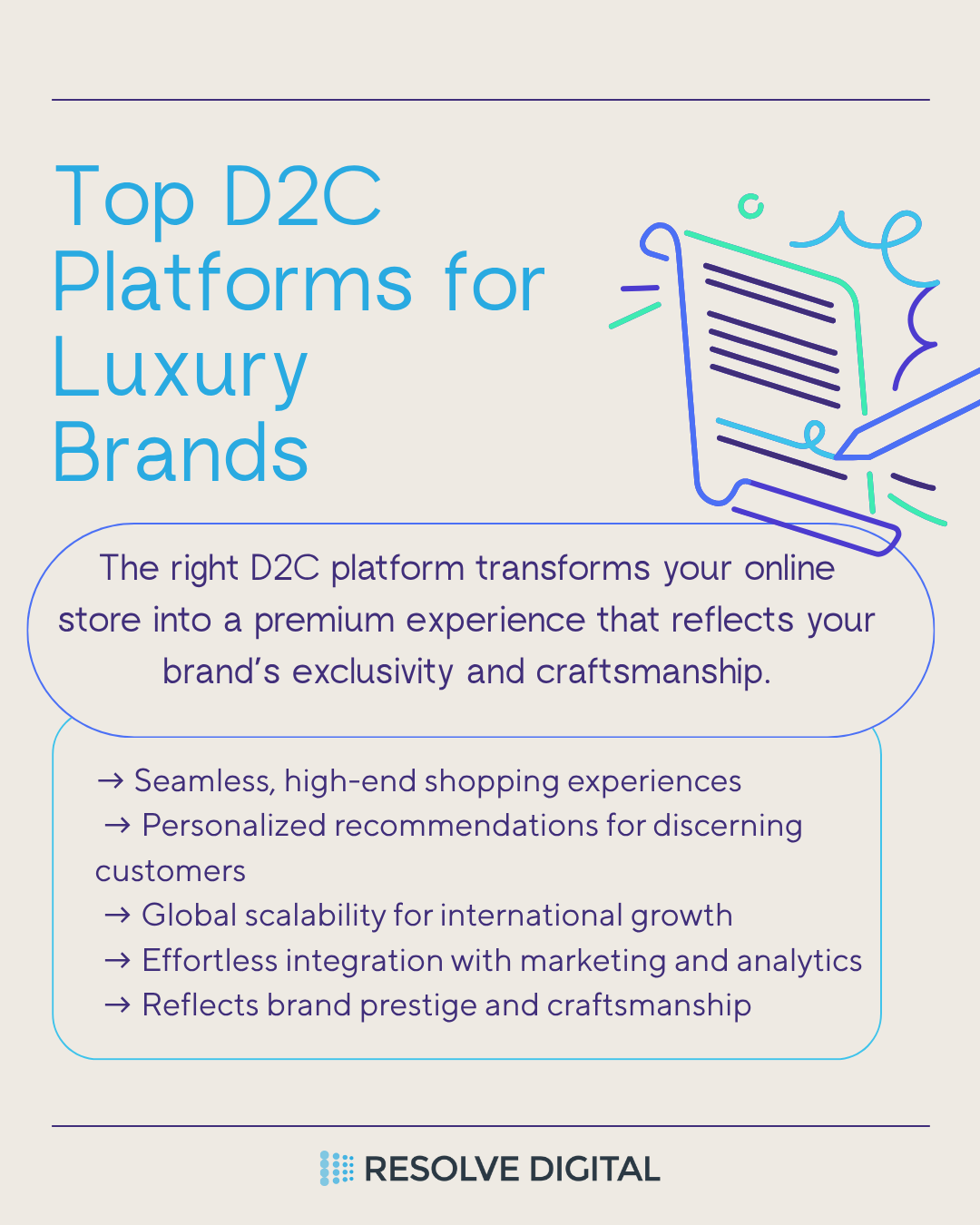Stop tracking and start asking! Explore the power of privacy-led marketing in luxury and find out why digital discretion is the secret to winning the hearts of high-net-worth customers this year.
eCommerce
A comprehensive guide to the leading D2C luxury eCommerce platforms that combine design, performance, and scalability for premium brands.

Luxury retail has shifted from exclusive boutiques to sophisticated D2C eCommerce, where technology meets brand storytelling. Leading brands now prioritize direct customer relationships, personalization, and seamless global experiences that reflect their prestige. The right platform balances operational excellence with the refinement and exclusivity central to luxury. This guide presents the top 10 D2C luxury eCommerce platforms driving modern digital strategies.
Shopify Plus has become the go-to choice for luxury and premium brands aiming to scale quickly while maintaining a refined digital presence. It offers beautifully designed templates, a smooth checkout process, and global payment integrations that simplify international sales. For luxury teams, the platform provides both speed and sophistication. Marketing departments can launch seasonal collections or limited-edition drops without depending on developers for every small change. Meanwhile, technical teams can still build custom storefronts and integrate headless frameworks for creative flexibility. Shopify Plus also handles PCI compliance, hosting, and updates, allowing brands to focus on storytelling, visual presentation, and customer loyalty.
Adobe Commerce remains a top choice for luxury D2C eCommerce brands that want complete creative and technical freedom. It enables businesses to design every detail of their customer experience, from personalized product pages to region-specific pricing. Heritage fashion houses and luxury retailers often choose Adobe Commerce because it supports complex product catalogs and integrates seamlessly with content and data tools. Its flexibility allows brands to merge editorial content with commerce to create immersive shopping experiences that reflect the craftsmanship and artistry of their products. While setup and maintenance require more technical resources, the result is a highly customized online store that truly represents a brand’s identity.
Salesforce Commerce Cloud appeals to luxury brands seeking a unified experience across physical boutiques and digital platforms. It connects seamlessly with Salesforce’s CRM tools, providing deep insights into customer behavior and helping deliver personalized recommendations at every touchpoint. This platform is ideal for brands that want their clients to enjoy the same high-end service whether they shop in-store or online. It supports loyalty programs, clienteling, and personalized communications that replicate the exclusivity of a boutique experience. Though the platform comes at a higher cost, its AI-driven merchandising, analytics, and automation tools make it a worthy investment for established global names.
Commercetools represents the shift toward composable commerce, where brands can choose and connect the best individual services rather than rely on one large platform. For luxury labels, this means the ability to create unique, editorial-style shopping experiences using modular architecture. The API-first design allows teams to integrate advanced personalization engines, AR try-on features, or virtual lookbooks with ease. Although it requires skilled developers and careful architecture planning, the payoff is agility and future-proofing. Commercetools suits modern luxury brands that value creativity, innovation, and independence in their digital presence.

BigCommerce offers a strong balance between SaaS simplicity and enterprise-grade functionality. It’s especially popular among high-end D2C brands that need to expand quickly while keeping technical overhead low. BigCommerce supports omnichannel selling, integrates with major ERPs, and provides strong SEO capabilities. Its performance, reliability, and built-in security appeal to brands with moderate technical teams who still want a high degree of customization. For luxury brands expanding into new regions or experimenting with direct channels, BigCommerce offers an accessible entry point into enterprise-level commerce without the complexity of traditional systems.
SAP Commerce Cloud is ideal for global luxury brands that manage multiple markets, currencies, and supply chains. It integrates directly with SAP’s extensive suite of business management tools, allowing seamless coordination between commerce, logistics, and finance. This level of integration is valuable for luxury groups that own multiple brands or product lines under one umbrella. The platform supports advanced pricing structures, multilingual capabilities, and detailed customer segmentation. Although it requires significant implementation time, SAP Commerce Cloud ensures consistency and control across a brand’s entire international ecosystem.
VTEX is rapidly gaining popularity among luxury retailers that want to expand globally and manage both direct and marketplace sales. It combines commerce, order management, and marketplace capabilities in one platform. This allows brands to sell through their own channels while also connecting with third-party marketplaces, all while maintaining control over product presentation and pricing. VTEX also includes live commerce features, which are increasingly popular in the luxury segment for interactive product showcases and exclusive launches. Its architecture supports quick regional rollouts and easy scalability, making it a smart choice for ambitious brands entering new territories.
Shopware, particularly Shopware 6, is a rising favorite among European luxury brands focused on storytelling and editorial-style shopping experiences. It combines strong design tools with a flexible backend, enabling brands to create immersive pages that highlight their heritage, craftsmanship, and artistry. Its Shopping Experiences feature helps marketing teams blend content and commerce seamlessly, turning every product page into a visual narrative. Shopware is especially suitable for brands that prioritize aesthetics and want to maintain creative control without building a custom enterprise system from scratch. It also supports multilingual stores and multi-currency setups, helping luxury labels reach diverse audiences.
A growing number of luxury brands in the D2C eCommerce markets are adopting headless commerce stacks that separate the front-end experience from the back-end systems. This setup allows complete design freedom and lightning-fast performance. By combining lightweight commerce engines with modern frameworks like Next.js or Remix, brands can build unique shopping experiences that feel like digital magazines or fashion editorials. These architectures make it easy to experiment with AR, video shopping, and immersive storytelling while keeping load times short. Although headless commerce requires a dedicated development team and more technical oversight, it gives brands unlimited flexibility to shape their online identity.
WooCommerce continues to serve as a practical, flexible option for emerging luxury brands that want control without large enterprise budgets. Built on WordPress, it offers excellent content management, SEO benefits, and plugin customization options. When paired with modern front-end frameworks or headless configurations, WooCommerce can power sophisticated and elegant online stores that rival more expensive solutions. Smaller labels and niche brands often choose WooCommerce because it allows gradual growth without heavy commitments to proprietary systems. With the right technical guidance, it can evolve from a simple boutique store to a full-fledged luxury eCommerce operation.
Luxury brands operate in a market where every detail matters, from brand perception to customer experience. Opting for top-tier D2C platforms ensures that their online presence matches the exclusivity and sophistication of their products. High-quality platforms provide seamless checkout, advanced personalization, global scalability, and robust security, features essential for serving discerning clientele. They also allow brands to integrate marketing, content, and analytics tools, enabling precise targeting and storytelling that resonates with their audience. By investing in the best platforms, luxury businesses protect their reputation, enhance customer loyalty, and create digital experiences that reflect their brand’s prestige.
→ Define your business goals and long-term growth strategy before evaluating any platform. Understanding whether your focus is rapid expansion, premium customer experience, or global reach will guide every decision.
→ Assess the complexity of your product catalog and inventory needs. Consider the number of SKUs, variants, and regional differences to ensure the platform can handle your operational requirements.
→ Understand your target audience and the level of personalization they expect. Luxury customers often demand curated experiences, seamless navigation, and tailored recommendations.
→ Evaluate your internal technical resources and team capabilities. Some platforms require dedicated developers or IT support, while others are easier to manage with smaller teams.
→ Determine scalability requirements for future growth and international expansion. A platform should support increased traffic, new markets, and multiple currencies without performance issues.
→ Identify integration needs with ERP, CRM, marketing automation, and analytics tools. Smooth connectivity ensures efficient workflows and data-driven decision-making.
→ Review security, compliance, and data privacy standards critical to your industry and customer base.
→ Estimate total cost of ownership, including implementation, maintenance, updates, and potential add-ons.
→ Prioritize flexibility for design, content, and marketing campaigns to maintain a distinctive brand identity.
→ Factor in customer support, platform reliability, and long-term vendor stability to ensure ongoing success.
Resolve Digital takes pride in turning ambitious D2C visions into measurable success. Over the years, we have partnered with some of the world’s most prestigious luxury brands, helping them create seamless and engaging online experiences that drive growth, loyalty, and global reach. Our expertise spans strategy, platform selection, and execution, ensuring every project aligns with a brand’s identity while exceeding performance expectations. By combining creative design with technical precision, we’ve consistently helped high-profile clients elevate their digital presence and achieve tangible business results. For a personalized consultation and to see how we can help your brand thrive online, contact us today. We'll set up a complimentary strategy call to discuss your needs.
The right partnership can help you elevate your online presence and grow your business by attracting your dream customers. Whether you're looking to develop a luxury eCommerce store from scratch, improve your existing site, or migrate to a different platform, Resolve Digital can help you succeed. Get in touch to learn more about our end-to-end eCommerce services!